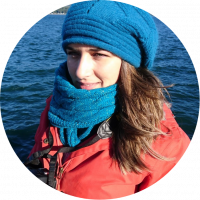 |
Postdoctoral Research FellowResearch UnitPelagic Ecosystems Lab DegreesPh.D., Biological Oceanography (Universidade Federal do Rio Grande, Brazil, & Vrije Universiteit Brussel, Belgium) |
Contact Information
Email: g.troina@oceans.ubc.ca
Website: Pelagic Ecosystems Lab
Twitter: @GenyfferTroina
ResearchGate: ResearchGate
Research Interests
I am interested in investigating the trophic and spatial ecology of marine top predators. I have been applying natural chemical tracers to learn about the foraging ecology and habitat use by marine mammals, how sympatric cetacean species compete for available resources, and how human-induced changes can affect the structure and dynamics of marine pelagic ecosystems.
Biography
As I grew up in a coastal city in southern Brazil, the sea, the marine ecosystems and particularly, marine mammals, have always fascinated me. When I was about 12 years old I had the opportunity to participate in a workshop in the oceanographic museum in Rio Grande (my home town), where I had the change to learn about the coastal and marine ecosystems of southern Brazil, their amazing marine life, and the challenges that they were facing as a result of human actions. I think that this is what drove me to pursue a career in marine sciences. I have been particularly interested in learning about the trophic ecology of the marine megafauna, how their feeding behaviour affects their spatial distribution and how environmental changes will affect their survival.
Selected publications:
Troina GC, Teixeira CR, Dehairs F, Secchi ER, Botta S (2023) Potential biases in dietary interpretation derived from stable isotope analysis of small dolphin teeth. Marine Environmental Research. https://doi.org/10.1016/j.marenvres.2022.105857
Botta S, Bassoi M, Troina GC (2022) Overview of franciscana diet. In: Simoes-Lopes PC, Cremer M (Eds) The Franciscana Dolphin: On the Edge of Survival. Pages 15-48. https://doi.org/10.1016/B978-0-323-90974-7.00003-3
Teixeira CR, Troina GC, Daura-Jorge FG, Simões-Lopes PC, Botta S (2022) A practical guide on stable isotope analysis for cetacean research. Marine Mammal Science. https://doi.org/10.1111/mms.12911
Troina GC, Riekenberg P, Van Der Meer MTJ, Botta S, Dehairs F, Secchi ER (2021) Combining isotopic analysis of bulk-skin and individual amino acids to investigate the trophic position and foraging areas of multiple cetacean species in the western South Atlantic. Environmental Research. 201: 111610. https://doi.org/10.1016/j.envres.2021.111610
Paschoalini VU, Troina GC, Campos LB, Santos MCO (2021) Trophic ecology and foraging areas of cetaceans sampled in the coastal waters of southeastern Brazil assessed through skin δ13C and δ15N. Journal of the Marine Biological Association UK. 101(2): 471-480. https://doi.org/10.1017/S0025315421000217
Lima RC, Di Tullio JC, Secchi ER, Castro FR, Troina GC (2021) Delphinids Mixed-Species Associations in the Oceanic Waters of the Western South Atlantic. Aquatic Mammals. 47(1): 53-62. https://doi.org/10.1578/AM.47.1.2021.53
Troina GC, Botta S, Dehairs F, Di Tullio JC, Elskens M, Secchi ER (2020) Skin δ13C and δ15N reveal spatial and temporal patterns of habitat and resource use by free-ranging odontocetes from the southwestern Atlantic Ocean. Marine Biology. 167(12). https://doi.org/10.1007/s00227-020-03805-8
Troina GC, Dehairs F, Botta S, Di Tullio JC, Elskens M, Secchi ER (2020) Zooplankton-based δ13C and δ15N isoscapes from the outer continental shelf and slope in the subtropical western South Atlantic. Deep Sea Research Part I. 159: 103235. https://doi.org/10.1016/j.dsr.2020.103235
Troina GC, Botta S, Secchi ER, Dehairs F (2016) Ontogenetic and sexual characterization of the feeding habits of franciscanas, Pontoporia blainvillei, based on tooth dentin carbon and nitrogen stable isotopes. Marine Mammal Science. 32: 1115-1137. https://doi.org/10.1111/mms.12316